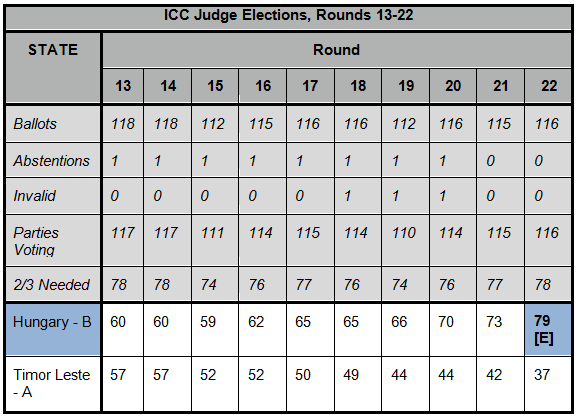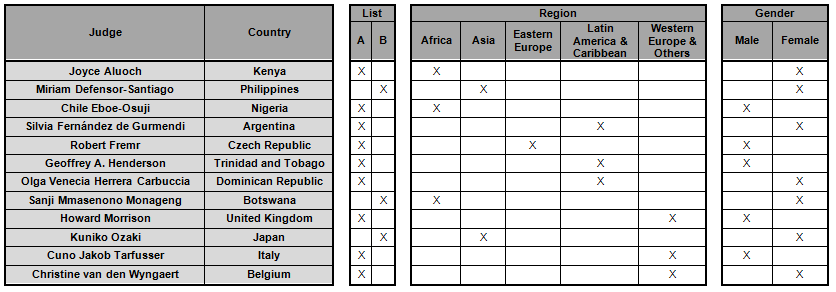By: Madaline George,
January 21, 2015
The 13th Meeting of the International Criminal Court (ICC) Assembly of States Parties (ASP) was held at the United Nations in New York City from December 8-17. Among the various items on the agenda was the election of six new judges to the court to replace the six judges elected in 2006, including current President, Song Sang-Hyun. The new judges were elected for a term of nine years, as mandated by Article 36(9)(a), and will take office on March 11, 2015.
The Rome Statute of the International Criminal Court governs the election of judges. Article 36(8)(a) provides that States Parties shall take into account the need within membership of the Court for:
(i) The representation of the principle legal systems of the world;
(ii) Equitable geographical representation; and
(iii) A fair representation of female and male judges.
Article 36(3)(b) mandates that candidates for election shall belong to one of two categories. List A includes those who “[h]ave established competence in criminal law and procedure, and the necessary relevant experience, whether as judge, prosecutor, advocate or in other similar capacity, in criminal proceedings” whereas List B contains those with “established competence in relevant areas of international law such as international humanitarian law and the law of human rights, and extensive experience in a professional legal capacity which is of relevance to the judicial work of the Court.” Elections are conducted so as to maintain a bench with at least nine judges from List A and five judges from List B.
Given these qualifications, the minimum voting requirements were:
– two judges from List B,
– two from Eastern-European States,
– one from Asia-Pacific States, and
– one male candidate.
Judges must be elected by a two-thirds majority of all States Parties casting valid ballots.
The following chart shows the relevant qualifications of the candidates per the ICC’s distribution requirements:
[Chart A, Judges for Election]
Elections went into the 22nd round of voting before all six judges were elected, with the final ten rounds being exclusively devoted to a contest between the candidates from Hungary and Timor Leste. The Advisory Committee on Nomination of Judges, formed by the ASP pursuant to Article 36(4)(c) of the Rome Statute issued a report on the candidates prior to the elections. Statements of qualifications of all the judicial candidates were also made publically available in October. The Korean candidate was quickly elected, governing 73 votes in the first ballot. Eventually the candidates from Poland, France, Germany, the Democratic Republic of the Congo and Hungary were elected.
[E]= Candidate elected in this round [W] = Candidacy withdrawn following that round
The six new judges will join a bench composed of the following judges, shown in the below chart according to their qualifications.
[Chart D, Judges on Bench]




